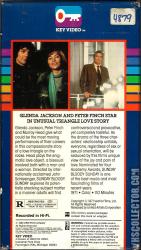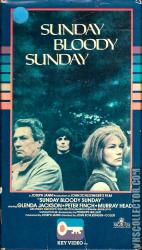Sunday Bloody Sunday
Catalog Number
4718
-
Primary Distributor (If not listed, select "OTHER")
Catalog Number
4718
Primary Distributor (If not listed, select "OTHER")
Release Year
Country
N/A (NTSC)
N/A | N/A | N/A
N/A | N/A
Sunday Bloody Sunday (1971)
Additional Information
Additional Information
It's about three decent people. They will break your heart.
This British film examines the choices individuals must make when confronted with a romantic relationship which is rewarding but does not offer them everything they want. In this sympathetic and psychologically precise drama, Alexandra Greville (Glenda Jackson), "Alex" to her friends, has a younger man as her sometime lover, the young sculptor Bob Elkin (Murray Head). Elkin is completely open about the fact that he is also the lover of her acquaintance, Dr. Daniel Hirsch (Peter Finch). These relationships continue in some kind of equilibrium until Alex and Bob agree to house-sit the children of a couple known to the three of them. In their roles, neither Head nor Finch "swished," or otherwise catered to homosexual stereotypes, and theirs was considered to be a groundbreaking, sympathetic portrayal of this kind of relationship, not condescending in any way. One highlight of the film is a scene in which Dr. Hirsch attends the Bar Mitzvah of his nephew. This critically well-received movie was unexpectedly successful at the box office. The film's director and screenwriter, as well as Jackson and Finch, were nominated for Academy Awards. ~
Sunday Bloody Sunday is a 1971 British drama film written by Penelope Gilliatt, directed by John Schlesinger and starring Murray Head, Glenda Jackson and Peter Finch. It tells the story of a free-spirited young bisexual artist (played by Head) and his simultaneous relationships with a female recruitment consultant (Jackson) and a male Jewish doctor (Finch).
The film is significant for its time in that Finch's homosexual character is depicted as successful and relatively well-adjusted, and not particularly upset by his sexuality. In this sense, Sunday Bloody Sunday was a considerable departure from Schlesinger's previous film Midnight Cowboy, which had portrayed its gay characters as alienated and self-loathing.
The film was released before the 1972 shooting by the British Army of unarmed protesters in Derry, Northern Ireland, an event dubbed "Bloody Sunday."
The film currently holds a 91% 'Fresh' rating on Rotten Tomatoes.[1]
This film appeared on both Roger Ebert's and Gene Siskel's Top 10 list of 1971. Listed as No. 5 and No. 6 respectively. Roger Ebert commented "The official East Coast line on John Schlesinger's Sunday Bloody Sunday was that it is civilized. That judgment was enlisted to carry the critical defense of the movie; and, indeed, how can the decent critic be against a civilized movie about civilized people? My notion, all the same, is that Sunday Bloody Sunday is about people who suffer from psychic amputation, not civility, and that this film is not an affirmation but a tragedy...I think 'Sunday Bloody Sunday' is a masterpiece, but I don't think it's about what everybody else seems to think it's about. This is not a movie about the loss of love, but about its absence."
Alan Bates was the original choice made by John Schlesinger for the role of Daniel Hirsh, the gay doctor. However he was held up filming The Go-Between (1970) and was replaced first by Ian Bannen, who dropped out after two week's filming, and later by Peter Finch. However, the role of Daniel was written as that of a much younger man.
Several actresses (including Dame Edith Evans and Thora Hird) politely refused the part of Glenda Jackson's mother, Mrs. Greville, because they thought the project was too risqué. Peggy Ashcroft accepted after the director explained to her the elements of the story and she gladly signed on.
Ian Bannen was fired from the role of Daniel Hirsh shortly after filming began. Apparently, he was so nervous about what kissing another actor onscreen might do to his career, he could not concentrate enough to even get going with the part. He later said that losing the role set back his career, and regretted it till his death.
Actor Daniel Day-Lewis made his film debut at the age of 14 in this film as a vandal in an uncredited role. He described the experience as "heaven", for getting paid £2 to vandalize expensive cars parked outside his local church.
Sunday Bloody Sunday was nominated for four Academy Awards: Best Actor (Peter Finch), Best Actress (Glenda Jackson), Best Director (John Schlesinger), and Best Original Screenplay (Penelope Gilliatt). Gilliatt won several Best Screenplay awards for the film, including the New York Film Critics Circle Award, Writers Guild of America, and Writers' Guild of Great Britain.
It won the BAFTA Award for Best Film. It also won acting honors for Finch and Jackson, as well as Best Director for Schlesinger.
Release Date: September 21, 1971 @ The Coronet
Distrib: United Artists
This British film examines the choices individuals must make when confronted with a romantic relationship which is rewarding but does not offer them everything they want. In this sympathetic and psychologically precise drama, Alexandra Greville (Glenda Jackson), "Alex" to her friends, has a younger man as her sometime lover, the young sculptor Bob Elkin (Murray Head). Elkin is completely open about the fact that he is also the lover of her acquaintance, Dr. Daniel Hirsch (Peter Finch). These relationships continue in some kind of equilibrium until Alex and Bob agree to house-sit the children of a couple known to the three of them. In their roles, neither Head nor Finch "swished," or otherwise catered to homosexual stereotypes, and theirs was considered to be a groundbreaking, sympathetic portrayal of this kind of relationship, not condescending in any way. One highlight of the film is a scene in which Dr. Hirsch attends the Bar Mitzvah of his nephew. This critically well-received movie was unexpectedly successful at the box office. The film's director and screenwriter, as well as Jackson and Finch, were nominated for Academy Awards. ~
Sunday Bloody Sunday is a 1971 British drama film written by Penelope Gilliatt, directed by John Schlesinger and starring Murray Head, Glenda Jackson and Peter Finch. It tells the story of a free-spirited young bisexual artist (played by Head) and his simultaneous relationships with a female recruitment consultant (Jackson) and a male Jewish doctor (Finch).
The film is significant for its time in that Finch's homosexual character is depicted as successful and relatively well-adjusted, and not particularly upset by his sexuality. In this sense, Sunday Bloody Sunday was a considerable departure from Schlesinger's previous film Midnight Cowboy, which had portrayed its gay characters as alienated and self-loathing.
The film was released before the 1972 shooting by the British Army of unarmed protesters in Derry, Northern Ireland, an event dubbed "Bloody Sunday."
The film currently holds a 91% 'Fresh' rating on Rotten Tomatoes.[1]
This film appeared on both Roger Ebert's and Gene Siskel's Top 10 list of 1971. Listed as No. 5 and No. 6 respectively. Roger Ebert commented "The official East Coast line on John Schlesinger's Sunday Bloody Sunday was that it is civilized. That judgment was enlisted to carry the critical defense of the movie; and, indeed, how can the decent critic be against a civilized movie about civilized people? My notion, all the same, is that Sunday Bloody Sunday is about people who suffer from psychic amputation, not civility, and that this film is not an affirmation but a tragedy...I think 'Sunday Bloody Sunday' is a masterpiece, but I don't think it's about what everybody else seems to think it's about. This is not a movie about the loss of love, but about its absence."
Alan Bates was the original choice made by John Schlesinger for the role of Daniel Hirsh, the gay doctor. However he was held up filming The Go-Between (1970) and was replaced first by Ian Bannen, who dropped out after two week's filming, and later by Peter Finch. However, the role of Daniel was written as that of a much younger man.
Several actresses (including Dame Edith Evans and Thora Hird) politely refused the part of Glenda Jackson's mother, Mrs. Greville, because they thought the project was too risqué. Peggy Ashcroft accepted after the director explained to her the elements of the story and she gladly signed on.
Ian Bannen was fired from the role of Daniel Hirsh shortly after filming began. Apparently, he was so nervous about what kissing another actor onscreen might do to his career, he could not concentrate enough to even get going with the part. He later said that losing the role set back his career, and regretted it till his death.
Actor Daniel Day-Lewis made his film debut at the age of 14 in this film as a vandal in an uncredited role. He described the experience as "heaven", for getting paid £2 to vandalize expensive cars parked outside his local church.
Sunday Bloody Sunday was nominated for four Academy Awards: Best Actor (Peter Finch), Best Actress (Glenda Jackson), Best Director (John Schlesinger), and Best Original Screenplay (Penelope Gilliatt). Gilliatt won several Best Screenplay awards for the film, including the New York Film Critics Circle Award, Writers Guild of America, and Writers' Guild of Great Britain.
It won the BAFTA Award for Best Film. It also won acting honors for Finch and Jackson, as well as Best Director for Schlesinger.
Release Date: September 21, 1971 @ The Coronet
Distrib: United Artists
Related Links






Comments0
Login / Register to post comments